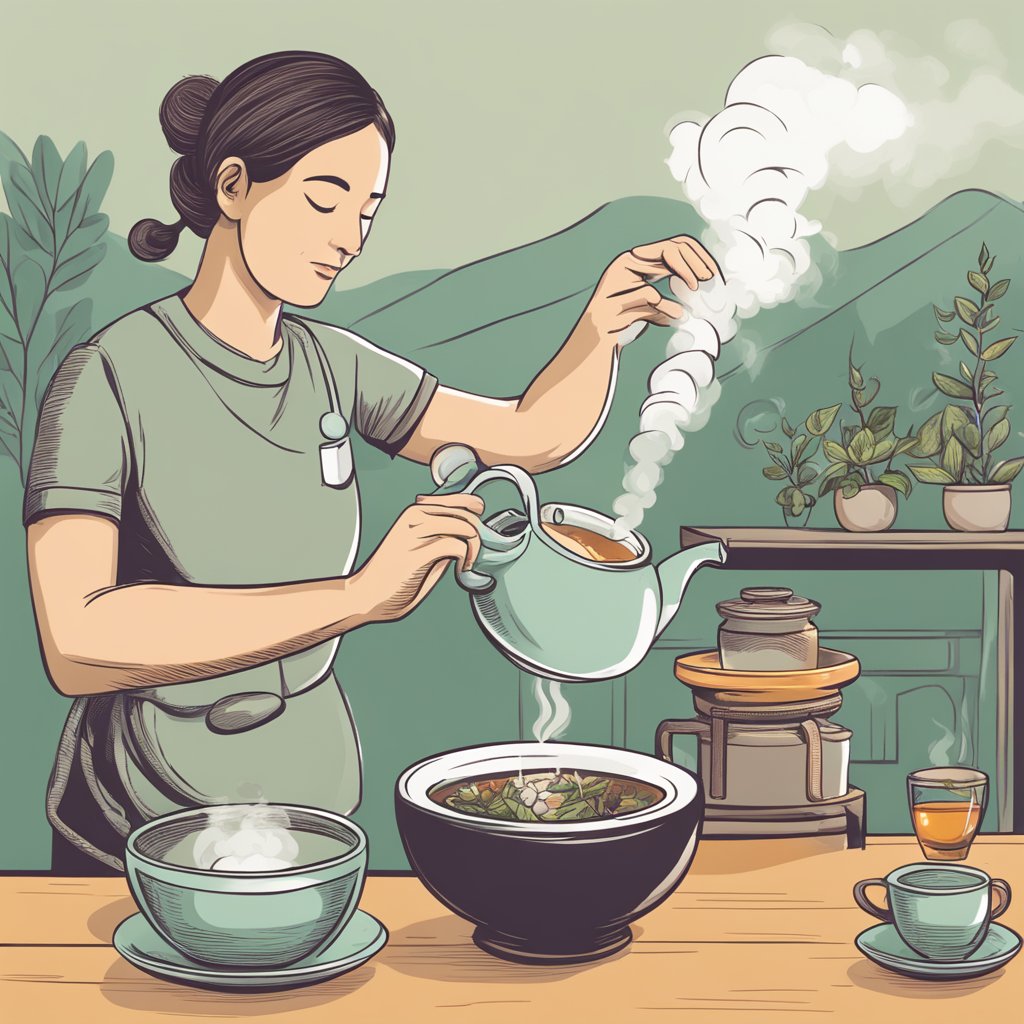If you're suffering from a chesty cough, you're likely experiencing discomfort and irritation in your throat and chest. A chesty cough (sometimes known as the "common cold") is a type of cough that produces mucus or phlegm, which can be difficult to cough up. It's often caused by an infection, such as a cold or flu, or by smoking.

Symptoms of a chesty cough can include a persistent dry cough that produces phlegm, wheezing, shortness of breath, and chest discomfort. If you're experiencing these symptoms, it's important to take care of yourself and seek treatment if necessary. There are several home remedies that can treat a cough that can help alleviate the symptoms of a chesty cough, including staying hydrated, using a humidifier with warm water and taking over-the-counter cough medicine. But our favourite is using a teaspoon of raw, unpasteurised natural honey such as our award-winning Welsh Honey. In the following sections, we'll go over these treatments in more detail to help you find relief from your cold symptoms with a couple of our favourite delicious honey remedies thrown in!
Understanding Chesty Cough
If you have a chesty cough, it means you are producing mucus or phlegm when you cough. This type of cough is also known as a wet or productive cough. Chesty coughs can be caused by a variety of factors, including viral infections, bacterial infections, allergies, or exposure to irritants such as smoke or pollution.
Chesty coughs are more common in children than in adults. Children may have difficulty coughing up mucus, which can cause them to choke or cough more frequently. If your child has a chesty cough, it is important to keep them hydrated and to seek medical attention if the cough persists for more than a few days.
Acute chesty coughs usually resolve on their own within a few days to a few weeks. However, if the cough persists for more than 3 weeks, it may be a sign of a more serious condition, such as chronic bronchitis or pneumonia. If you have a persistent cough, it is important to see a doctor to determine the underlying cause and receive appropriate treatment.
To help alleviate the symptoms of a chesty cough, there are several home remedies you can try. Drinking plenty of fluids can help thin out the mucus, making it easier to cough up. Hot drinks, such as herbal tea or hot water with lemon and honey can also provide relief.
In addition to staying hydrated, you can also try using a humidifier or taking a steamy shower to help loosen the mucus. Over-the-counter cough medicines may also be helpful, but be sure to read the label carefully and follow the recommended dosage.
Overall, chesty coughs can be uncomfortable and disruptive, but they usually resolve on their own with time and self-care. If your symptoms persist or worsen, however, it is important to seek medical attention to rule out any underlying conditions.
Causes and Symptoms

A chesty cough, also known as a productive cough, is a cough that produces mucus or phlegm. It is usually caused by an infection in the respiratory tract, such as a cold, flu, or bronchitis. Other causes of chesty coughs include allergies, smoking, and exposure to irritants such as dust, fumes, or pollution.
The symptoms of a chesty cough include coughing up phlegm or mucus, wheezing, shortness of breath, and chest tightness or discomfort. These symptoms can be uncomfortable and disruptive to your daily life.
If you are experiencing symptoms of a chesty cough, it is important to stay hydrated and get plenty of rest. You can also try using a humidifier or steam inhalation to help loosen the mucus in your chest. Avoid smoking and exposure to irritants, as these can make your symptoms worse.
Over-the-counter cough medicines can also be helpful in relieving symptoms. However, it is important to read the label carefully and follow the instructions, as some cough medicines may not be suitable for certain people or may interact with other medications.
In some cases, a chesty cough may be a sign of a more serious condition, such as pneumonia or asthma. If your symptoms persist or worsen, or if you experience chest pain, difficulty breathing, or cough up blood, you should seek medical attention immediately.
Home Remedies for Chesty Cough
A chesty cough can be an uncomfortable and frustrating experience. Fortunately, there are several home remedies that can help alleviate the symptoms and speed up the healing process.
One of the most effective ways to treat a chesty cough is to drink plenty of fluids. Water, warm tea, and soup can help thin out the mucus in your chest, making it easier to cough up. You can also try drinking a hot lemon and honey drink to help soothe a sore throat and ease congestion. [^1]
Another popular home remedy for a chesty cough is steam therapy. Inhaling steam can help loosen mucus and ease congestion in the chest. You can take a hot shower or bath, or simply inhale steam from a bowl of hot water. Adding essential oils, such as eucalyptus or peppermint, to the water can also help ease congestion. [^2]
There are also several natural remedies to treat a chesty cough. For example, ginger tea can help soothe a sore throat and reduce inflammation in the chest. Additionally, honey has been shown to be an effective cough suppressant and can help soothe the throat. [^3]
While these home remedies may help alleviate the symptoms of a chesty cough, it's important to remember that they are not a substitute for medical treatment. If your symptoms persist or worsen, it's important to seek medical attention.
Related Posts:
Prevention and When to See a Doctor

Preventing a chesty cough can be challenging, but there are some measures you can take to reduce your risk of getting one. Here are some tips to help you avoid getting a cold, which can lead to a chesty cough:
- Wash your hands regularly with soap and water, especially before eating and after being in public places.
- Avoid close contact with people who have a cold or the flu.
- Use tissues to cover your mouth and nose when you cough or sneeze, and dispose of them immediately.
- Avoid touching your face, especially your mouth, nose, and eyes.
- Stay hydrated by drinking plenty of water and other fluids.
If you do develop a chesty cough, it's usually nothing to worry about and will go away on its own within a few weeks. However, there are some situations where you should see a doctor:
- If your cough lasts for more than three weeks.
- If you have a high fever or chest pain.
- If you are coughing up blood.
- If you are short of breath or wheezing.
- If you have a weakened immune system due to a medical condition or medication.
In these cases, your doctor may recommend medical treatment for your cough, such as antibiotics or cough suppressants.
It's important to avoid using over-the-counter cough medicines without first consulting with a doctor or pharmacist. Many of these medicines are not effective and can have side effects, especially in children.
By taking steps to prevent a chesty cough and knowing when to see a doctor, you can help keep yourself and those around you healthy.
Frequently Asked Questions

Q: What are some natural cough remedies for a chesty cough?
A: Some natural cough remedies for a chesty cough include gargling with salt water, using a humidifier, drinking thyme tea, and using over-the-counter cough medicines with natural ingredients.
Q: How can I ease my cough symptoms at home?
A: You can ease your cough symptoms at home by using natural remedies such as thyme tea, using a humidifier, gargling with salt water, and using natural cough suppressants.
Q: What is a chesty cough and how can I treat it naturally?
A: A chesty cough is a wet cough that produces mucus. You can treat it naturally by drinking thyme tea, using a humidifier, and using over-the-counter natural chesty cough remedies.
Q: What are the benefits of using natural remedies for a chesty cough?
A: Natural remedies for a chesty cough can help relieve cough symptoms without the use of synthetic chemicals, and they may have fewer side effects compared to over-the-counter medications.
Q: Can I use thyme as a natural remedy for a chesty cough?
A: Yes, thyme has been traditionally used as a natural remedy for chesty cough due to its expectorant properties. You can drink thyme tea or use thyme in cooking to help relieve chesty cough symptoms.
Q: How does a humidifier help with a chesty cough?
A: A humidifier can help ease cough symptoms by adding moisture to the air, which can soothe the airways and reduce throat irritation, making it easier to expel mucus from the chest.
Q: Are there any home remedies for treating a chesty cough in children?
A: Yes, you can use natural remedies such as thyme tea, salt water gargle, and a humidifier to help ease chesty cough symptoms in children. However, it's important to consult a pediatrician before using any home remedies for children.
Q: How can I naturally relieve a chesty cough at night?
A: You can naturally relieve a chesty cough at night by using a humidifier in the bedroom, drinking warm thyme tea before bed, and using natural cough suppressants to help reduce nighttime coughing.
Q: Can I use salt water gargle as a remedy for a chesty cough?
A: Yes, gargling with salt water can help soothe a chesty cough by reducing throat irritation and thinning mucus, making it easier to expel from the airways.
Q: How effective are natural cough remedies in making a chesty cough go away?
A: Natural cough remedies such as thyme tea, salt water gargle, and using a humidifier can help ease chesty cough symptoms and promote healing, but individual effectiveness may vary. It's important to consult a healthcare professional for persistent chesty cough symptoms.